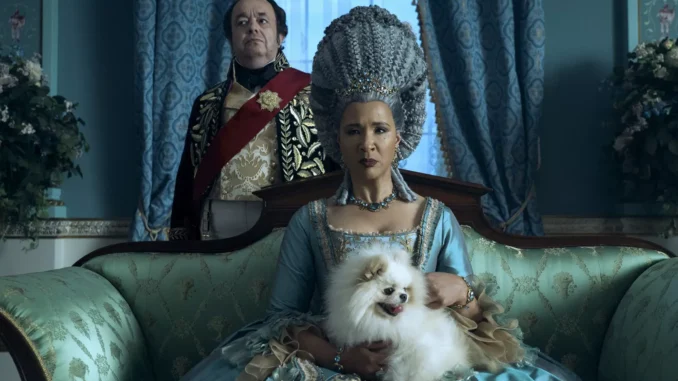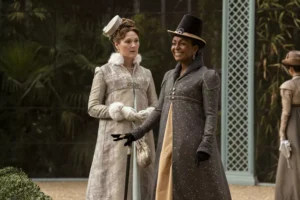
“I feel a personal attachment to this queen and her story,” the show’s creator tells EW.
There’s nothing we love more than royal gossip.
Queen Charlotte: A Bridgerton Story has plenty of that to go around — from Princess Augusta’s (Michelle Fairley) plotting to George (Corey Mylchreest) and Charlotte’s (India Amarteifio) “even days” to Lady Danbury’s (Arsema Thomas) affair to Reynolds (Freddie) Dennis) and Brimsley’s (Sam Clemmetts) romance.
But now that the limited Netflix series has reached its conclusion, we still have some questions. Luckily, creator Shonda Rhimes has answers. Whether you’re wondering how this show impacts future seasons of Bridgerton or why she wanted to write a show about loneliness, we’ve got you covered.
Read on for Rhimes’ answers to all our burning questions.
ENTERTAINMENT WEEKLY: When did you first start thinking about your own series for Queen Charlotte? She’s not a character in the original novels, but she is a figure from history and, and quickly became a fan favorite.
SHONDA RHIMES: As played by Golda Rosheuvel [on Bridgerton], she was always incredibly fascinating to me. The idea of that character as inhabited by that actor really made me interested and I started to think about how she came to be, who she was and how much fun she is, but how much we don’t see her personal side. We only see her public side, and I really wanted to delve into that.
On Bridgerton, you’re executive producer, but here you took a more direct role as showrunner and creator. What made you want to wear that hat here?
Well, it’s the hat I usually wear. When we started Bridgerton, I was a little too exhausted for that to be my hat. Getting to work with other writers was exciting. But for this one, it feels personal. I felt a personal attachment to this queen and to her story, and I really enjoyed telling it.

Can you elaborate on that personal attachment? Was she included in Bridgerton at your suggestion?
We had a lot of talks about it — the idea of bringing in a queen and the idea of making her a woman of color was very much part of at the forefront of our discussions. We all knew that that’s what we wanted to do.
You’ve made Charlotte a person of color based on historical record, which is still disputed. Do you think that Britain and historians at large would ever seriously acknowledge Charlotte’s heritage?
I have never once thought about that. I have to be honest, I don’t know. Stories are going to do what they’re going to do.
Do you think that there’s anything the Windsors could learn or take to heart from this story?
No. I’m not telling their story. And I’m not trying to tell them anything with this story. They are real live, living, breathing people and I like to respect that fact and just enjoy the fact that Queen Charlotte is my fictional version of what we’ve created.
With Bridgerton, we have this diverse world, and there of course has been explanation of the Queen’s history and how people like the Duke of Hastings received their titles. How much was diving into the history of that and how fraught that was at her arrival your impetus for wanting to tell this story?
It wasn’t really my main focus in telling the story, but I couldn’t tell the story without it. We say that George and Charlotte’s love unites the Bridgerton-verse, so that’s great. But I knew that we were going to have to see how that all happened, how it came about, how difficult it was, and I got to imagine that and draw on real experience for that and see how that grew from there.
Was any part of that wanting to push back or answer criticism of Bridgerton that it doesn’t show or take into account the real challenges of what uniting society in this way would be like?
When we’re in Bridgerton, we’re past that point. They’ve already been united, so I don’t know how we would show something that happened in the past. I wanted to tell the story of this young woman of color arriving in this world where she never imagined she’d be and marrying a man she did not know and what ramifications that would have.
Queen Charlotte also gives us some stories in the Bridgerton timeline, most importantly a budding friendship between Violet (Ruth Gemmell) and Lady Danbury (Adjoa Andoh). Something that you’ve long championed in your work is encouraging the sexuality of older women. Why was that something that you really wanted to bring forward in their story here?
I felt like it was important. You really want to see these women for who they are. In Bridgerton, we’re watching them in their public world take care of their daughters and their nieces and shove them all towards marriage. I wanted to see what’s going on in their private world. The idea that we get to explore is exciting. And I really wanted to have this story where Violet’s really seriously thinking about stepping into the world again.